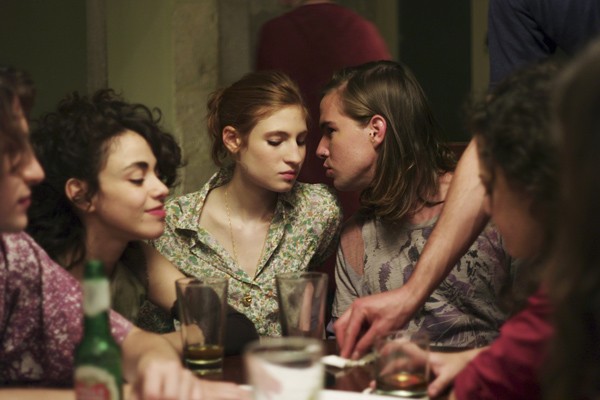Feminists In Focus 1 of 2
January 24, 2012 by Amy Stone
Feminists in Focus: Reporting back from the New York Jewish Film Festival Mission Accomplished for ‘Bottle in the Gaza Sea’
(Check the calendar for the festival, presented by The Jewish Museum and the Film Society of Lincoln Center, at www.thejewishmuseum.org/
 What a coup for the most political film at this year’s NY Jewish Film Festival – “A Bottle in the Gaza Sea” — to make its world premiere at the festival. And how encouraging to see that fresh and touching ground remains to communicate the message that the bloodshed between Israelis and Palestinians is too inhuman to continue.
What a coup for the most political film at this year’s NY Jewish Film Festival – “A Bottle in the Gaza Sea” — to make its world premiere at the festival. And how encouraging to see that fresh and touching ground remains to communicate the message that the bloodshed between Israelis and Palestinians is too inhuman to continue.
Tal, a teen whose family has moved from France to Jerusalem, slips a message into a bottle saying that she refuses to accept that only hatred can exist between Israelis and Palestinians. She gets her brother to throw the bottle into the ocean while he’s on army duty near Gaza. An e-mail response to “bottleaccess” eventually comes from “Gazaman.”
The resulting e-mails become poignant when terrorist attacks in Jerusalem are met with Israeli air strikes in Gaza.
The film is based on the award-winning novel of the same name by French writer Valérie Zenatti, who spent her teen years in Israel. (Her earlier book, “When I Was a Soldier,” about her life in the Israeli army, was reviewed in Lilith.)
Speaking at the film’s premiere, Zenatti said the novel grew out of her refusal to blame either side in the conflict.
“Bottle” combines bloodshed and death with the delicacy of the unfolding e-mail relationship between Gazaman Naïm and Tal, whom he addresses as Miss Peace. Thanks to the Israeli co-producers, French director Thierry Binisti was able to film in Israel, with Arab neighborhoods standing in for Gaza. Binisti explained that Gaza remains off-limits to outsiders except for journalists and humanitarian organizations.
Both sides of the story are convincing, with Tal, a teenager coming of age in a comfortable middle class home, experimenting with liquor and body piercing and experiencing a terrorist bombing in her local cafe. Naïm’s life is limited to hanging out with his smartass friends and cousins and delivering T-shirts for his uncle, with life punctuated by gruesome bombings from Israel and brutality from the Gaza cops.
For these young men, Tel Aviv women are long-legged with beautiful eyes. Naïm laments he’s only seen the covered-up women of the religious settlement where he worked. Not all that different from Israeli women, Naïm’s mom is a supportive, cigarette-smoking worker at the local hospital. But it’s still a man’s world. When Naïm’s cousin marries, we see the groom in a suit and tie and the beat-up white wedding limo but no sign of the bride. What does manhood mean for Gazans? Pre-wedding, the groom-to-be tells Naim that he’ll finally become a man.
The shots of the major border crossing are shocking. The border sign reads “Welcome to Erez Crossing,” but it looks more like what we’d expect for Guantanamo. A world of gray metal, giant gates clang shut behind empty corridors and locked doors. Binisti says his film crew was the first allowed to film this frightening defense system. Perhaps there’s hope that Israel allowed such grim reality to be screened.
Part of what makes “Bottle” work is the freshness of the acting. French actress Agathe Bonitzer, who learned Hebrew for the role, plays 17-year-old Tal with a certain innocence. And there’s no doubting her physical appeal – tall, slim, long red hair, and those long legs Naïm’s buddies dream of. It also helps that Acre-born Arab Israeli actor Mahmoud Shalaby is very appealing in the role of Naïm – dark hair, light gray eyes, and the charm that landed him the lead in his first film after his Palestinian rap band split up. (“Bottle” is his second film.)
“A Bottle in the Gaza Sea,” in French, Hebrew, English and Arabic with English subtitles, opens in France in February and, hopefully, will make its way not just to the U.S. and Israel but to Gaza and the West Bank.
 Please wait...
Please wait...